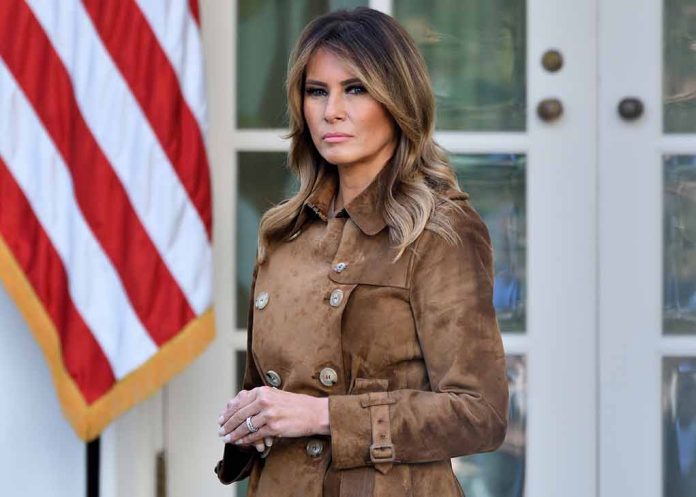
First Lady Melania Trump makes a powerful return to the public stage, calling on Congress to pass legislation that would make sharing non-consensual intimate images a federal crime, while criticizing Democrats for their absence at a crucial roundtable discussion.
Key Takeaways
- First Lady Melania Trump is advocating for the bipartisan “Take It Down Act” to combat non-consensual sharing of intimate images, including AI-generated deepfakes.
- The bill would require social media platforms to remove harmful content within 48 hours of a victim’s request and make distribution a federal crime.
- The Senate has passed the legislation with support from Senators Ted Cruz and Amy Klobuchar, but the House has yet to take action.
- Melania Trump criticized Democratic leaders for not attending the roundtable discussion, urging both parties to prioritize children’s safety over partisan politics.
- This marked Melania’s first solo public appearance since resuming her role as First Lady on January 20.
Melania Trump Champions Online Safety Legislation
First Lady Melania Trump has returned to the public spotlight with a clear mission: protecting America’s youth from digital exploitation. During a Capitol Hill roundtable, she strongly advocated for the “Take It Down Act,” which would criminalize the sharing of intimate images without consent, including AI-generated deepfakes. The bipartisan legislation has already passed in the Senate but awaits action in the Republican-controlled House, where the First Lady’s advocacy could prove influential in advancing the bill through Congress.
The bill, co-sponsored by Senators Ted Cruz (R-Texas) and Amy Klobuchar (D-Minnesota), would require social media platforms to remove non-consensual intimate content within 48 hours of a victim’s request. This urgency reflects growing concerns about the devastating impact such content can have, particularly on teenagers. The legislation was inspired by real-world cases, including an incident involving a non-consensual AI-generated image shared on Snapchat that demonstrated the urgent need for federal protections.
Melania's day at the Capital – supporting a bill to protect women from deepfake explicit images 🖤 pic.twitter.com/X8vUoxSFLv
— Keeping Up With The Trumps (@KUWTTRUMPS) March 3, 2025
Bipartisan Support and Democratic Absence
While emphasizing the bipartisan nature of the legislation, Melania Trump did not hesitate to point out the absence of Democratic leaders at the roundtable discussion. “I was heartened to learn that Sen. Cruz and Sen. Klobuchar united to prioritize this fundamental matter. I must admit, however, I expected to see more Democrat leaders with us here today to address this serious issue. Surely, as adults, we can prioritize America’s children ahead of partisan politics,” she stated, challenging lawmakers to rise above political differences.
The First Lady went on to say during her address, “I’m here with you today with a common goal, to protect our youth from online harm. The widespread presence of abusive behavior in the digital domain affects the daily lives of our children, families and communities. Addressing this issue is essential for fostering a safe, and supportive environment for our young people.” The roundtable marked Melania’s first solo public appearance since the administration began on January 20, continuing her advocacy work from her previous “Be Best” initiative that focused on children’s wellbeing and online safety. Senator Ted Cruz emphasized the real harm caused by non-consensual intimate imagery, stating, “No one should have to experience the pain, humiliation, and trauma that so many Americans have at the hands of AI deepfakes.”
Corporate Support and State-Level Precedent
The legislation has garnered support from major technology companies, including Meta, the parent company of Facebook and Instagram. Meta spokesperson Andy Stone emphasized the company’s commitment to preventing the sharing of non-consensual intimate images, stating, “Having an intimate image real or AI-generated shared without consent can be devastating and Meta developed and backs many efforts to help prevent it.” This corporate backing could prove crucial for implementing the bill’s requirements effectively across major platforms.
Similar protections already exist at the state level in Florida, where non-consensual pornography is a serious offense punishable by up to five years in prison. However, attorney Spencer Kuvin noted that federal legislation might face legal challenges based on its connection to interstate commerce. “The only way this could be a federal issue is if it affects commerce between the states,” Kuvin explained. The Take It Down Act’s focus on major social media platforms that operate across state lines appears designed to address this constitutional requirement.
Sources:
First lady Melania Trump advocates for ‘Take It Down Act’ to protect people online
WATCH: First lady Melania Trump advocates for protecting teens from non-consensual online content
Melania Trump Slams Democrats for Not Supporting Take It Down Act: ‘Prioritize America’s Children’



